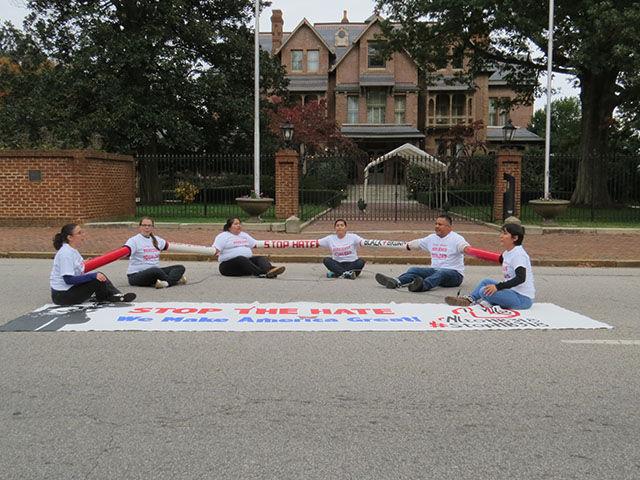After about an hour of protesting in front of the Governor’s Mansion on Thursday in response to Gov. Pat McCrory’s signing of a bill that places further restrictions on acceptable identification for persons of undocumented status, six protesters rushed into the street and chained themselves together to block traffic in front of a banner that read “Stop the Hate; We Make America Great.”
The six protesters were arrested later in the evening after emergency crews had to cut them out of their chains and other bindings.
While chained to her companions, Nayely Irais Perez-Huerta shouted, “We are going to continue to organize, we are going to continue to fight, we are going to continue to stand with other marginalized communities, this is not the end!”
A crowd of more than 100 Hispanics and non-Hispanics chanted, “Money for jobs and education; not war and deportation,” among other slogans, while gathered in protest of House Bill 318 being signed into law Wednesday, which further limits the forms of identification that are acceptable for immigrants.
“We cannot allow our local officials in towns and cities in North Carolina to make up their own rules that conflict with our nation’s laws and our nation’s values,” McCrory stated during the bill signing.
As a result of HB 318 going into law, the acceptable forms of identification now are pay stubs, utility bills, housing contracts, property tax receipts, automobile insurance policies and financial statements from institutions regulated by North Carolina. Immigrants may no longer use documents from foreign embassies as identification.
The bill also reinforces the requirement that those seeking government assistance look for work and standardizes the rules surrounding sanctuary cities which do not enforce anti-immigration laws. Proponents of the bill feel that it protects the rule of law and the ability of authorities to enforce the law.
NC State students Yerson Padilla, Bianca Olivares and Jorge Pacheco were in attendance.
“Just because you don’t have a government-issued ID doesn’t necessarily mean you shouldn’t have water at your house,” said Pacheco, a senior studying technology, engineering and design education, referring to the difficulty of paying bills that would come from the changes to ID requirements. “I just feel like it’s a basic human right to have these kind of things, and the fact that it’s being taken away because it’s not government-issued stuff is not good; it’s not what we should be going for in the U.S.”
Representatives of the North Carolina Republican Party were also in attendance. Ricky Diaz, senior communications advisor for the NCGOP, has a personal connection to the battle over immigration.
“As someone whose father came here legally from Cuba, I think it’s important to understand that there are two sides to this,” Diaz said. “Let’s start with what this bill actually does—it ends the policy of non-cooperation among law enforcement officers when it comes to enforcing immigration laws.”
The “policy of non-cooperation” refers to the sanctuary cities which Diaz said is where politicians are trying to control how police officers do their duties.
With the crowd chanting behind him, Diaz said there needs to be an honest discussion about the issue of immigration.
“A true intellectually honest discussion about this bill really looks at what this does and not some of the ‘fanning the flame’—passionate arguments on both sides as it relates to the broader immigration issue,” Diaz said.
Diaz said that the polarization over this bill came from Hillary Clinton who, among other groups, pressured McCrory to veto the bill.
One of the groups to pressure McCrory over the bill was the Catholic Charities of the Diocese of Raleigh. Rick Miller-Haraway, a representative of the group, invoked the words of Pope Francis in his recent visit to the United States in opposition to HB 318.
“Pope Francis just came to this country, and he said we need to welcome the immigrant; we need to be a people of mercy, and this bill is about anything but that,” Miller-Haraway said. “It’s not only an anti-immigrant bill—it’s a bill against people who are struggling to get jobs and to be employed.”
Dallas Woodhouse, former state director of Americans for Prosperity and now the leader of the NCGOP, tweeted during the demonstration that it was an example of “more vocal support of law breaking” and “support for illegal immigration” calling the participants “noisy” and saying they were distracting police from their normal duties.
Woodhouse founded Carolina Rising, a conservative political nonprofit that has been supportive of McCrory and other Republican state leaders including Sen. Thom Tillis.
However, Padilla, a junior studying women’s and gender studies, said this law makes it harder for immigrants to be successful in the United States.
“I know several friends and their families affected by [HB 318 becoming law], and I feel that it takes away from the quote-unquote ‘American Dream,’” Padilla said. “I feel like it’s very wrong as a state, even as a nation. Let’s not forget the history of the U.S.—why are we making it hard for immigrants, especially undocumented immigrants, to try to achieve that American Dream that we always talk about and discuss in our schools?”
Susan Lugo, who has been in America since 2012 and currently has six generations of her Hispanic family living in North Carolina, attended another protest on Saturday afternoon. The governor and first lady held an Adopt-a-Pet event on the lawn of their mansion the same afternoon, right across the street from the protest. According to Lugo, McCrory completely ignored the protest.
“Really? This country cares more about cats and dogs than they do about human beings? Especially productive human beings?” Lugo said. “America is a country of immigrants; why are Hispanics the only ones being targeted?”








